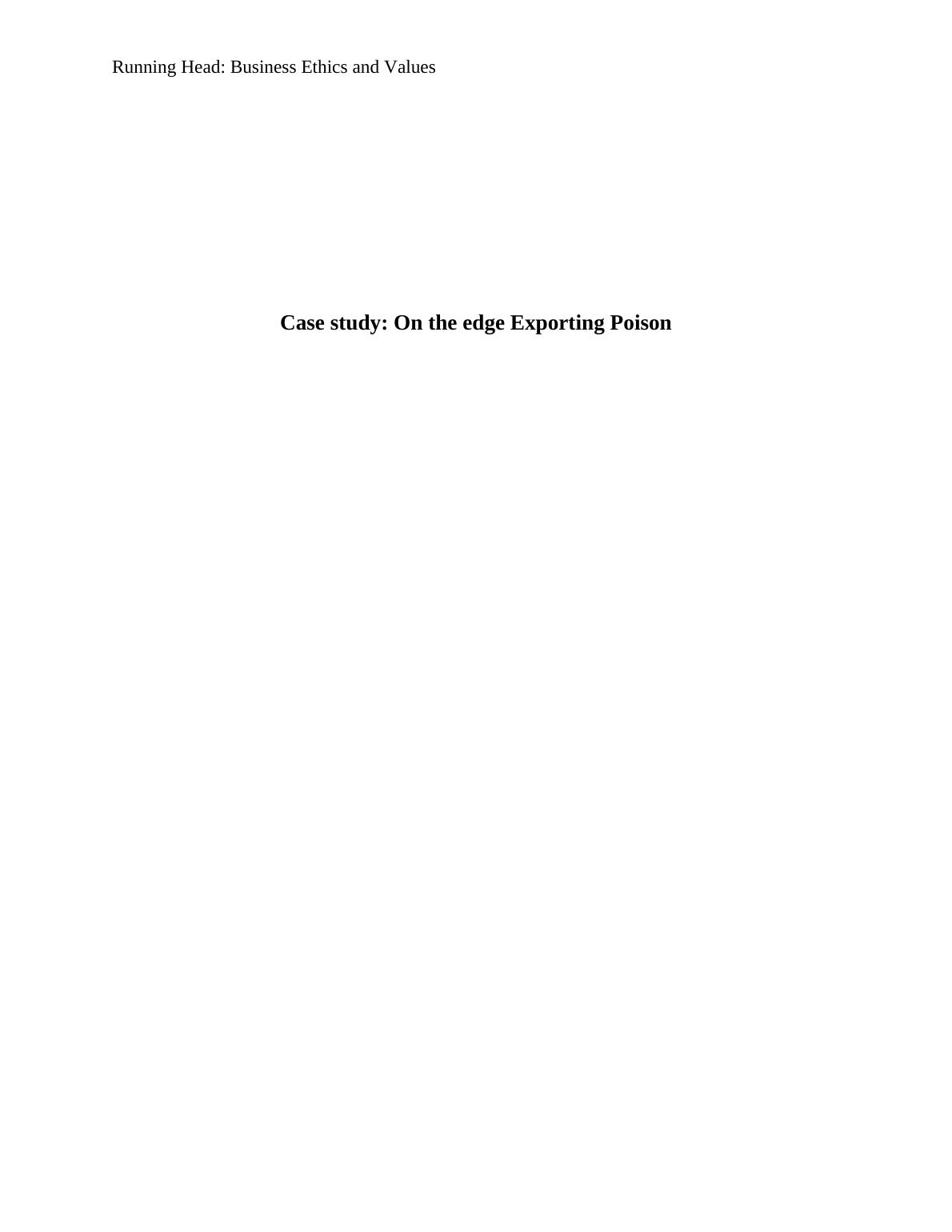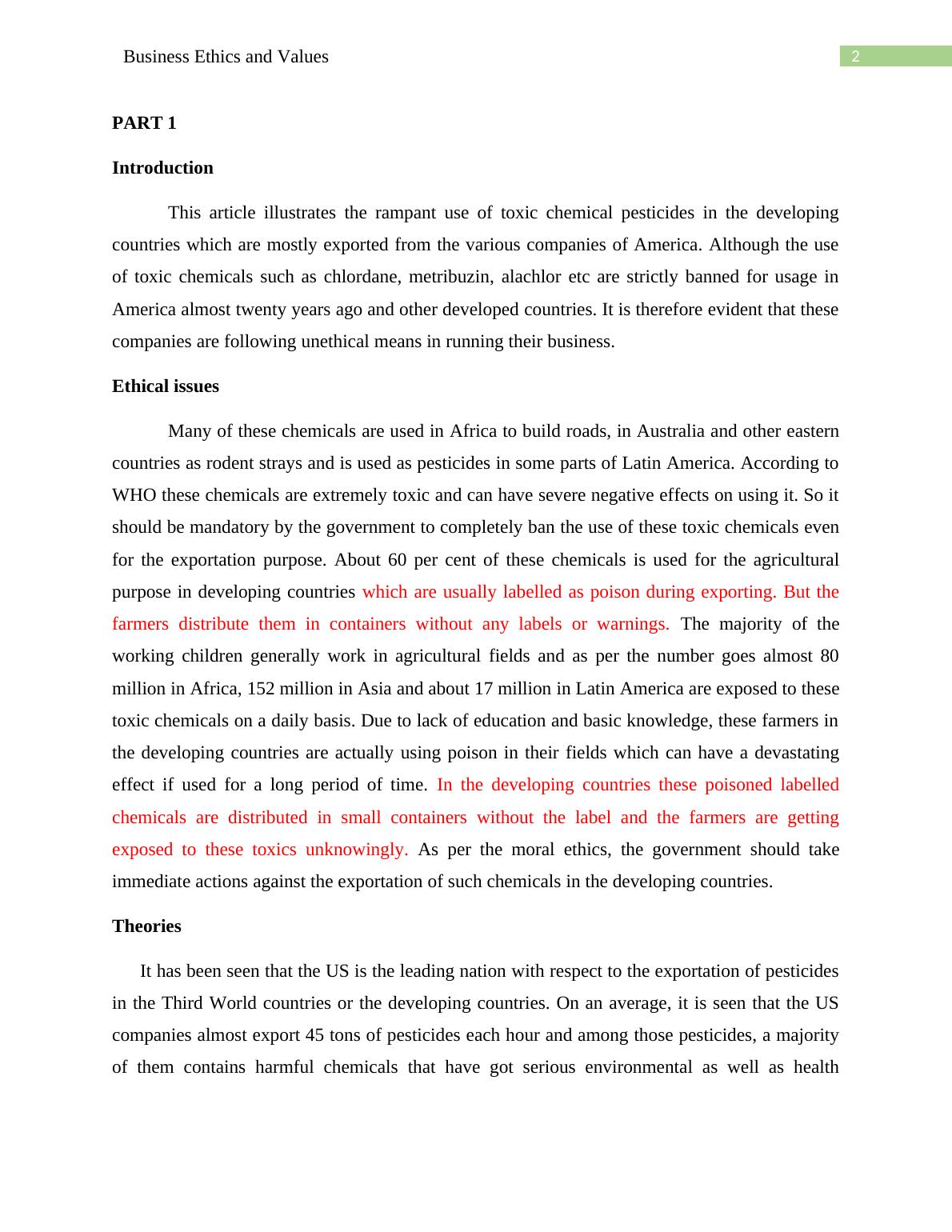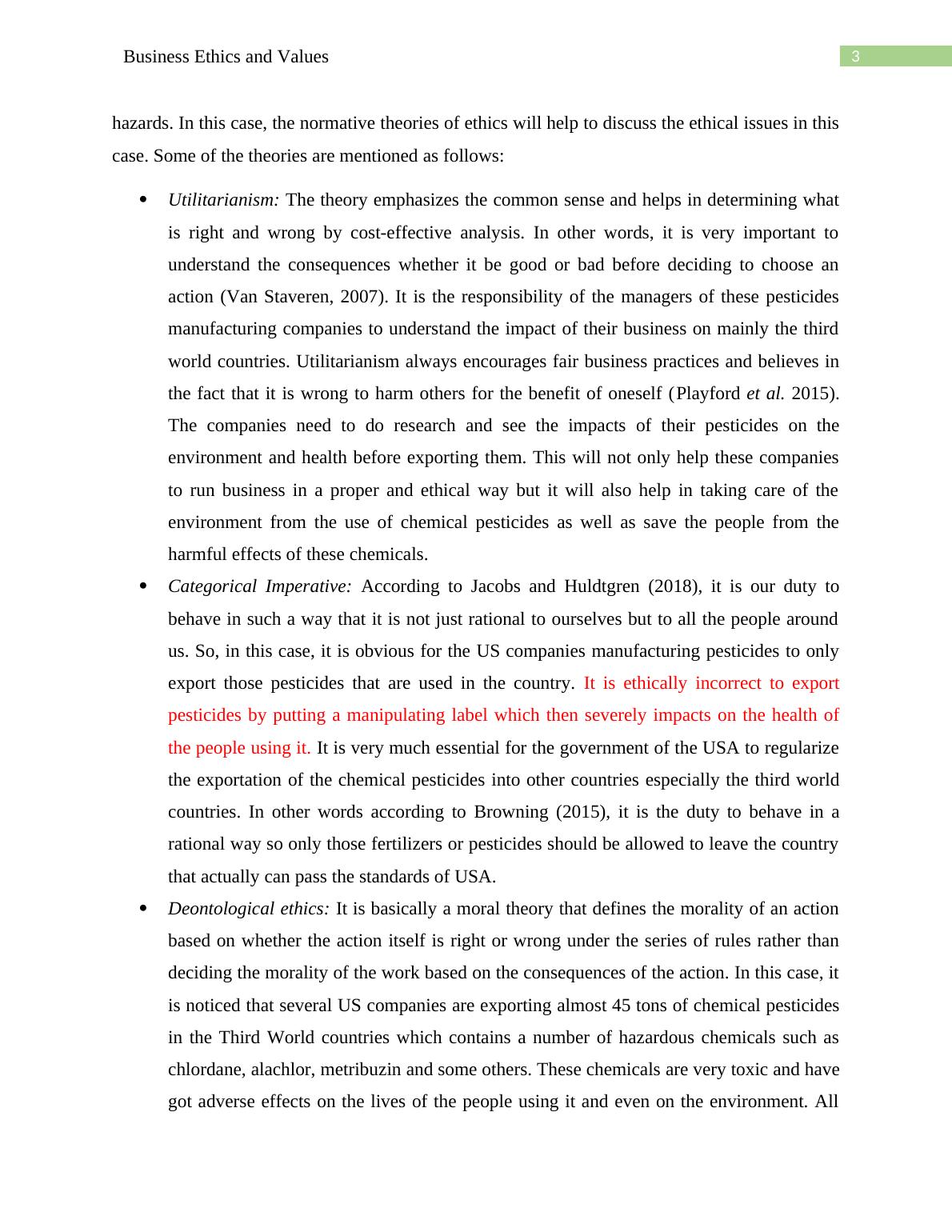Business Ethics and Values
Added on 2023-01-11
6 Pages1886 Words95 Views
Running Head: Business Ethics and Values
Case study: On the edge Exporting Poison
Case study: On the edge Exporting Poison

Business Ethics and Values2
PART 1
Introduction
This article illustrates the rampant use of toxic chemical pesticides in the developing
countries which are mostly exported from the various companies of America. Although the use
of toxic chemicals such as chlordane, metribuzin, alachlor etc are strictly banned for usage in
America almost twenty years ago and other developed countries. It is therefore evident that these
companies are following unethical means in running their business.
Ethical issues
Many of these chemicals are used in Africa to build roads, in Australia and other eastern
countries as rodent strays and is used as pesticides in some parts of Latin America. According to
WHO these chemicals are extremely toxic and can have severe negative effects on using it. So it
should be mandatory by the government to completely ban the use of these toxic chemicals even
for the exportation purpose. About 60 per cent of these chemicals is used for the agricultural
purpose in developing countries which are usually labelled as poison during exporting. But the
farmers distribute them in containers without any labels or warnings. The majority of the
working children generally work in agricultural fields and as per the number goes almost 80
million in Africa, 152 million in Asia and about 17 million in Latin America are exposed to these
toxic chemicals on a daily basis. Due to lack of education and basic knowledge, these farmers in
the developing countries are actually using poison in their fields which can have a devastating
effect if used for a long period of time. In the developing countries these poisoned labelled
chemicals are distributed in small containers without the label and the farmers are getting
exposed to these toxics unknowingly. As per the moral ethics, the government should take
immediate actions against the exportation of such chemicals in the developing countries.
Theories
It has been seen that the US is the leading nation with respect to the exportation of pesticides
in the Third World countries or the developing countries. On an average, it is seen that the US
companies almost export 45 tons of pesticides each hour and among those pesticides, a majority
of them contains harmful chemicals that have got serious environmental as well as health
PART 1
Introduction
This article illustrates the rampant use of toxic chemical pesticides in the developing
countries which are mostly exported from the various companies of America. Although the use
of toxic chemicals such as chlordane, metribuzin, alachlor etc are strictly banned for usage in
America almost twenty years ago and other developed countries. It is therefore evident that these
companies are following unethical means in running their business.
Ethical issues
Many of these chemicals are used in Africa to build roads, in Australia and other eastern
countries as rodent strays and is used as pesticides in some parts of Latin America. According to
WHO these chemicals are extremely toxic and can have severe negative effects on using it. So it
should be mandatory by the government to completely ban the use of these toxic chemicals even
for the exportation purpose. About 60 per cent of these chemicals is used for the agricultural
purpose in developing countries which are usually labelled as poison during exporting. But the
farmers distribute them in containers without any labels or warnings. The majority of the
working children generally work in agricultural fields and as per the number goes almost 80
million in Africa, 152 million in Asia and about 17 million in Latin America are exposed to these
toxic chemicals on a daily basis. Due to lack of education and basic knowledge, these farmers in
the developing countries are actually using poison in their fields which can have a devastating
effect if used for a long period of time. In the developing countries these poisoned labelled
chemicals are distributed in small containers without the label and the farmers are getting
exposed to these toxics unknowingly. As per the moral ethics, the government should take
immediate actions against the exportation of such chemicals in the developing countries.
Theories
It has been seen that the US is the leading nation with respect to the exportation of pesticides
in the Third World countries or the developing countries. On an average, it is seen that the US
companies almost export 45 tons of pesticides each hour and among those pesticides, a majority
of them contains harmful chemicals that have got serious environmental as well as health

Business Ethics and Values3
hazards. In this case, the normative theories of ethics will help to discuss the ethical issues in this
case. Some of the theories are mentioned as follows:
Utilitarianism: The theory emphasizes the common sense and helps in determining what
is right and wrong by cost-effective analysis. In other words, it is very important to
understand the consequences whether it be good or bad before deciding to choose an
action (Van Staveren, 2007). It is the responsibility of the managers of these pesticides
manufacturing companies to understand the impact of their business on mainly the third
world countries. Utilitarianism always encourages fair business practices and believes in
the fact that it is wrong to harm others for the benefit of oneself (Playford et al. 2015).
The companies need to do research and see the impacts of their pesticides on the
environment and health before exporting them. This will not only help these companies
to run business in a proper and ethical way but it will also help in taking care of the
environment from the use of chemical pesticides as well as save the people from the
harmful effects of these chemicals.
Categorical Imperative: According to Jacobs and Huldtgren (2018), it is our duty to
behave in such a way that it is not just rational to ourselves but to all the people around
us. So, in this case, it is obvious for the US companies manufacturing pesticides to only
export those pesticides that are used in the country. It is ethically incorrect to export
pesticides by putting a manipulating label which then severely impacts on the health of
the people using it. It is very much essential for the government of the USA to regularize
the exportation of the chemical pesticides into other countries especially the third world
countries. In other words according to Browning (2015), it is the duty to behave in a
rational way so only those fertilizers or pesticides should be allowed to leave the country
that actually can pass the standards of USA.
Deontological ethics: It is basically a moral theory that defines the morality of an action
based on whether the action itself is right or wrong under the series of rules rather than
deciding the morality of the work based on the consequences of the action. In this case, it
is noticed that several US companies are exporting almost 45 tons of chemical pesticides
in the Third World countries which contains a number of hazardous chemicals such as
chlordane, alachlor, metribuzin and some others. These chemicals are very toxic and have
got adverse effects on the lives of the people using it and even on the environment. All
hazards. In this case, the normative theories of ethics will help to discuss the ethical issues in this
case. Some of the theories are mentioned as follows:
Utilitarianism: The theory emphasizes the common sense and helps in determining what
is right and wrong by cost-effective analysis. In other words, it is very important to
understand the consequences whether it be good or bad before deciding to choose an
action (Van Staveren, 2007). It is the responsibility of the managers of these pesticides
manufacturing companies to understand the impact of their business on mainly the third
world countries. Utilitarianism always encourages fair business practices and believes in
the fact that it is wrong to harm others for the benefit of oneself (Playford et al. 2015).
The companies need to do research and see the impacts of their pesticides on the
environment and health before exporting them. This will not only help these companies
to run business in a proper and ethical way but it will also help in taking care of the
environment from the use of chemical pesticides as well as save the people from the
harmful effects of these chemicals.
Categorical Imperative: According to Jacobs and Huldtgren (2018), it is our duty to
behave in such a way that it is not just rational to ourselves but to all the people around
us. So, in this case, it is obvious for the US companies manufacturing pesticides to only
export those pesticides that are used in the country. It is ethically incorrect to export
pesticides by putting a manipulating label which then severely impacts on the health of
the people using it. It is very much essential for the government of the USA to regularize
the exportation of the chemical pesticides into other countries especially the third world
countries. In other words according to Browning (2015), it is the duty to behave in a
rational way so only those fertilizers or pesticides should be allowed to leave the country
that actually can pass the standards of USA.
Deontological ethics: It is basically a moral theory that defines the morality of an action
based on whether the action itself is right or wrong under the series of rules rather than
deciding the morality of the work based on the consequences of the action. In this case, it
is noticed that several US companies are exporting almost 45 tons of chemical pesticides
in the Third World countries which contains a number of hazardous chemicals such as
chlordane, alachlor, metribuzin and some others. These chemicals are very toxic and have
got adverse effects on the lives of the people using it and even on the environment. All

End of preview
Want to access all the pages? Upload your documents or become a member.
Related Documents
Exporting Poison: Ethical Issues and Solutionslg...
|9
|2266
|98